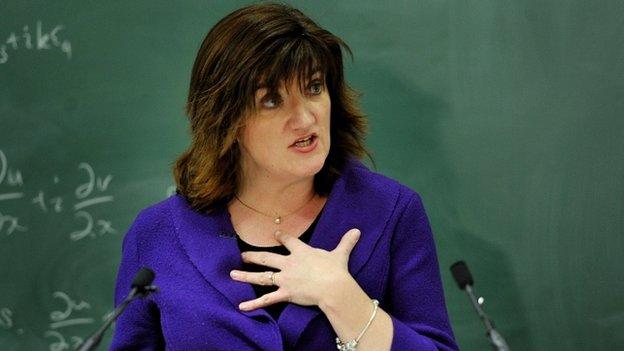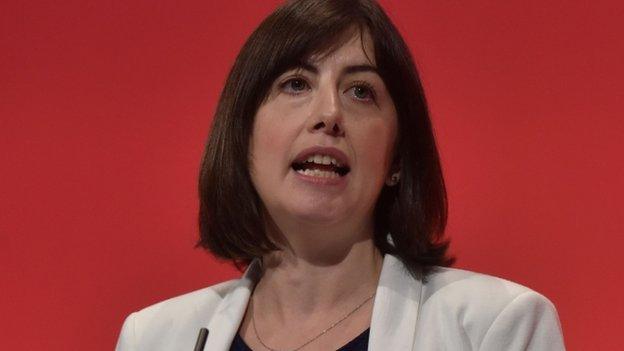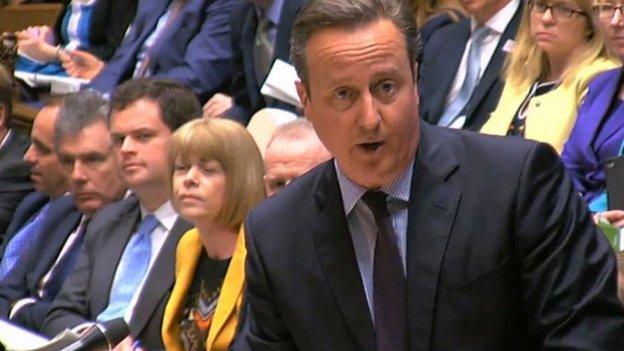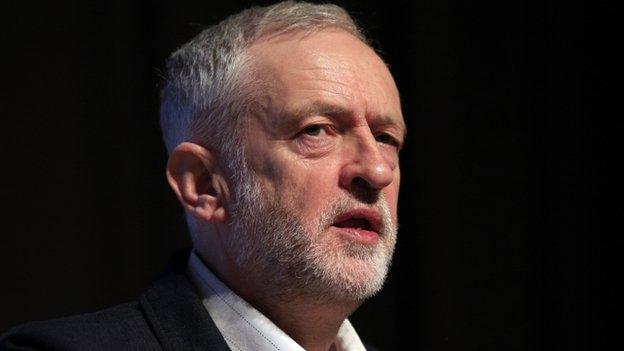Tory backbenchers challenge compulsory academy plan
- Published

Nicky Morgan's compulsory academy plan raised concerns among Conservative backbenchers
Conservative backbenchers have raised doubts about the government's plan to force all schools in England to become academies.
There were warnings from MPs about the lack of choice and fears for the implications for rural schools.
Labour's shadow education secretary Lucy Powell said: "What choice is there in a one size fits all policy?"
But Education Secretary Nicky Morgan accused Labour of "deliberate misinterpretation".
This was an Opposition Day debate on the government's White Paper, but some of the most pointed criticism came from the Conservative benches.
The government won the vote, but Labour said that the strength of feeling showed ministers would not be able to go ahead with the school plans in their current form.
'No evidence'
Tim Loughton, a former minister in the education department, questioned the imposition of a "compulsory and arbitrary time line".
"As a Conservative I also believe in choice," he told the House of Commons.
Tory MP Jason McCartney also highlighted the importance of choice and Caroline Nokes questioned the value of enforced academy status for primary schools which were already high achievers.

Lucy Powell said the government was obsessed with school structures instead of standards
Will Quince said there was "no evidence that academies are somehow automatically better than state-maintained schools".
"Call me old-fashioned but I hold the view that if you've got a well-governed, well-run school that's performing well, just leave it alone and let it do its job."
Another Conservative, Steve Brine, said: "If I were to sum up the concerns expressed to me by teachers locally it would be confusion, I think, as to why something that is so obviously not broken needs fixing."
James Cartlidge said that he had visited an outstanding school in his constituency that did not want to become an academy.
"What I fundamentally struggle with is a very simple point that I should go to them and say despite the fact that your school is outstanding, that all of your staff are working brilliantly and delivering fantastic education, that we are now going to force you to become an academy."
Edward Leigh suggested that there might be time for "compromise" about how this would apply to small primary schools.
'Structures not standards'
Labour's Lucy Powell opened the debate by challenging the expense and purpose of the shake-up of England's schools.
She accused the government of being "obsessed with school structures instead of standards".
And she asked MPs: "What is autonomous about forcing a highly performing school into an academy chain?"
Mrs Morgan accused Labour of "scaremongering and ignoring the achievements of both the profession and our education system".
She said that improving schools through the academy process was a step towards "real social justice".
There were sharp exchanges about how the government's proposals would affect the role of parent governors.
The White Paper says: "We will no longer require academy trusts to reserve places for elected parents on governing boards."
But the education secretary rejected the suggestion that this would mean abolishing the role of parent governors.
Parent governors
There had also been arguments over the academy plans in Prime Minister's Questions, earlier on Wednesday.
David Cameron had rejected claims it would mean the "removal of parent governors from school governing bodies".

David Cameron said it was "simply wrong" to say parent governors would be scrapped
Mr Cameron said it was "simply wrong" to say it would scrap them.
"Parents have a great role to play, but no school should think that simply by having parent governors you've solved the problem about how to engage with parents," said the prime minister.
"The Labour motion says the White Paper proposes the removal of parent governors from school governing bodies. It does no such thing."
The government argues that removing the requirement for parent governors does not mean that academies would not want to retain them.
At present, academy chains can already remove governing bodies from their individual schools - and a single board of trustees can act as a governing body for the entire chain.
These boards must have at least two elected parents - but under the White Paper's proposals, academy chains could operate without any elected parent representatives on any of its boards.
An academy chain has already scrapped governing bodies for its academies.
E-ACT, with academies across the West Midlands, Buckinghamshire, Bristol, Yorkshire and north-west England, abolished all of its governing bodies for individual schools in January, ending the powers of scrutiny of parent governors.
- Published13 April 2016

- Published16 March 2016

- Published25 March 2016

- Published12 April 2016